In Semester 1 2017, we welcomed 14 students on ACICIS’ Development Studies Immersion Program (DSIP). 10 students undertook this program with the support of New Colombo Plan Mobility Grants. The DSIP begins with a six-week academic component, where participants complete Indonesian language studies at Universitas Gadjah Mada (UGM), alongside a series of seminars and field visits. The program is brought to a close with a series of final reflective presentations from the participants. Participants share their experiences from their eight-week Development Placement with local non-governmental organisations (NGOs) in Yogyakarta and Central Java. ACICIS was pleased to continue working with Host Organisations who have hosted DSIP participants over the past few years, and we were also excited to partner with new organisations this semester.
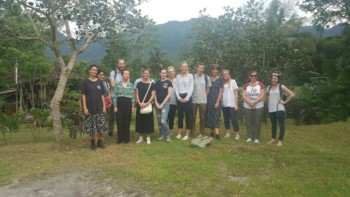
This semester, we continued our long-standing partnership with Satu Nama, who hosted four DSIP participants across their organisation. Yashinta Hoeth from The University of Queensland joined Satu Nama’s People Empowerment Department, which focuses on community assistance through grassroots, participatory and inclusive approaches on development. During her placement, Yashinta was assigned projects that gave her the opportunity to visit local communities around Yogyakarta. She assisted Satu Nama with their current projects in Tejokusuman and Gendingan kampung (villages), and with the Women’s Organisation project in Ngargosari, Kulon Progo. She also contributed to various Satu Nama organisational programs, such as writing articles for the website and translating a booklet for Guyub Bocah, Satu Nama’s Children Group.
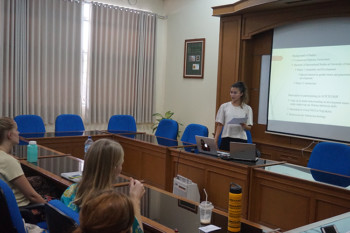
The other three DSIP participants were hosted by Satu Nama’s Politics and Democracy Department, in which each participant worked on a specific issue. Steven Singleton from The University of New England focused more on the department’s project titled Kelas Politik Cerdas Berintegritas – politics classes organised by Satu Nama at local communities – where Steve assisted with the learning modules. He also had the opportunity to participate in focus groups, and studied the various anti-corruption programs run by the United Nations Office on Drugs and Crime (UNODC) with civil society organisations in Indonesia.
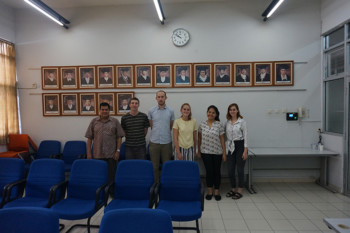
Siri Andersen from The University of New South Wales worked with the Social Inclusion team at Satu Nama, focusing on freedom of religion and the rights of religious minorities. The Social Inclusion team partnered with The Asia Foundation on Program Peduli to raise awareness on the rights of religious minorities, as communities who hold traditional religious beliefs or other unrecognised religions have encountered limitations in accessing public services. Siri’s projects included translating court documents and researching online articles targeted towards spreading awareness on this issue.
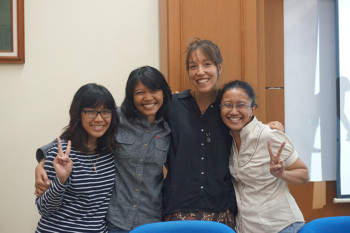
Conghui Lu from The University of Adelaide was placed in Satu Nama’s Women and Politics team, which focuses on empowering Indonesian women to be politically informed and confident. Conghui conducted research on Indonesian women in politics, and then organised forums to discuss women’s political experiences in Indonesia and Australia. She also had the opportunity to meet inspiring Indonesian women in politics, for example Ms Titi Anggraini, the Executive Director of Association for Elections and Democracy or Perludem, the leading civil society organisation working on election reform in Indonesia. From her interviews and research, Conghui wrote several article pieces for Satu Nama.
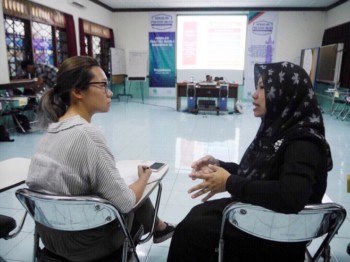
On the same topic of gender, ACICIS also worked with two gender-focused organisations this semester. Samsara, an organisation that works in fighting for the Sexual and Reproductive Health rights in Indonesia, particularly on safe abortion. As a new ACICIS Host Organisation, Samsara hosted Emma O’Hara from Murdoch University. Emma’s projects at Samsara included organising a ‘Samsara Talk’ twice a week, a forum in which participants share on a specific issue. She also assisted with the translation of the company profile on the organisation’s website, as well as editing bilingual Wikipedia content on abortion, sexual health and reproductive health.
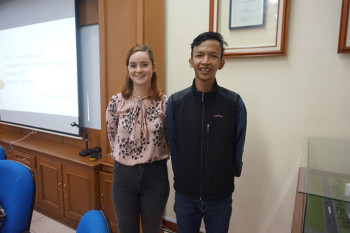
This semester, ACICIS also welcomed Aksara as a new Host Organisation for the DSIP. Aksara is a non-government organisation working in gender equality and women’s rights. Aksara’s main projects focus on good governance, disaster risk management and climate change, as well as media development. Aksara hosted Laura De Bono from RMIT University, providing her with opportunities to attend several focus group discussions, particularly on topics of gender and disaster risk management, elections on local-government level, and the impacts of apartment buildings to local communities.
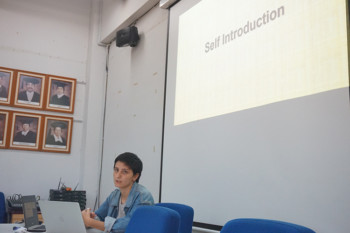
Another new Host Organisation that partnered with ACICIS this semester is ViaVia Travel Jogja, an eco-tourism establishment that offers alternative tours and courses in Yogyakarta. ViaVia Travel emphasis is on engagement with the local communities and eco-friendly approaches for their tours and courses. Glenda Cassidy from Murdoch University worked with the ViaVia Travel team to improve several of their tours, particularly focusing familyt tours and organised hospitality training for staff.
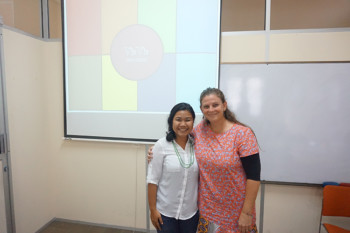
Project Child Indonesia, an organisation working in alleviating poverty in the coastal and riverside communities in Indonesia, particularly for children hosted two DSIP students this semester. Rachel Davis from RMIT University was involved in the development of Project Child’s new social business program, titled “Project Child Online Store”. The social business is a fundraising channel that acts as an online “thrift shop” where people can donate and buy second-hand clothes. Rachel helped the online store team with creating the strategic planning report for the project, which includes a Standard Operational Procedure, Online Store Marketing Guideline, Agreement Letter, Cost and SWOT analyses, and other documents to set up the project.
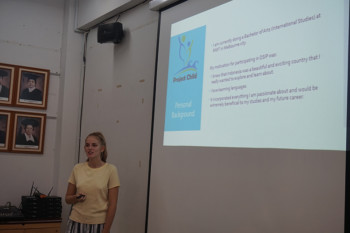
ACICIS DSIP student Kelly McEtchin from San Diego State University was involved in launching another exciting program Project Child, the Internet Literacy Program. The program provides education about the internet to children through schools and parents. The program focuses particularly on internet taboos, safety, and online programs that can help with the children’s studies and personal development. Kelly is a continuing student from Semester 43, where as an ACICIS Flexible Language Immersion Program student she commenced volunteering for Project Child during her spare time, assisting Project Child with the program development. In Semester 44, the project had reached the implementation stage and Kelly was heavily involved with the running of the program – from drafting up the curriculum, recruiting, and liaising with stakeholders.
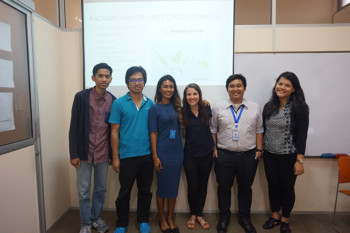
We were delighted to be working with Yayasan SAMIN once more, an organisation that advocates for children’s rights in Indonesia. Peter Morley from Murdoch University, who also spent last semester on the DSIP program, continued his placement at SAMIN, assisting them with advocacy programs on mitigating child trafficking. Peter also researched the impact of cultural approaches in parenting which could be used as a foundation for future SAMIN projects.
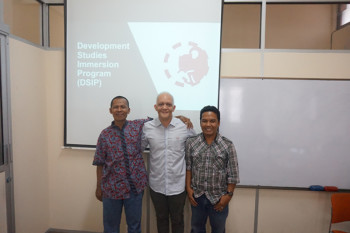
ACICIS was delighted to partner with RedR Indonesia once more. RedR Indonesia is a member of the largest humanitarian capacity building organisation, and specialises in identifying, training, rostering, deploying and supporting humanitarian workers whenever a disaster occurs. RedR hosted Rachael Matthews from Murdoch University. Throughout her placement with RedR, Rachael assisted the team with designing RedR Indonesia brochures and developing concept notes for RedR’s Humanitarian Training for the Indonesian National Agency for Disaster Management (BNPB).
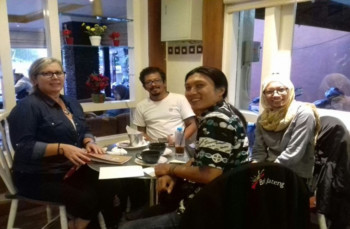
Yayasan Rumah Energi also came on board to be a Host Organisation for ACICIS’ DSIP this semester through their Biogas Rumah (BIRU) program in Klaten, after hosting a Business Professional Practicum student earlier this year. BIRU is a program that promotes renewable energy through using biogas reactors as a sustainable energy source in the local communities in Indonesia. James Lawther from RMIT University and Louise Waddell from Murdoch University were fortunate to relocate to Klaten, Central Java, to gain first-hand experience of the BIRU program. James and Louise were involved in project site visits around BIRU’s various fantastic programs around the Special Region of Yogyakarta and Central Java, learning about biogas and bio-slurry, as well as attending training sessions organised by BIRU. As a part of the placement, BIRU sent James to Bandung and Louise to Malang to look at other BIRU projects outside of Central Java and Yogyakarta. In Bandung, James learned about the use of duckweed, a plant that is considered destructive in excess, to feed dairy cows in the region. In Malang, Louise had the opportunity to see first-hand the results of bio-slurry, and how organic farming using bio-slurry has slowly become a growing market.
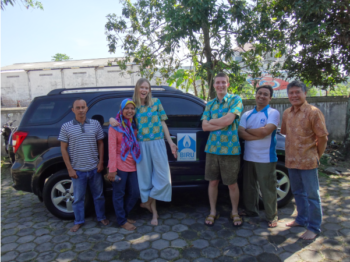
Edwina Brennan from the University of New England worked on a permaculture project. Edwina worked with Panti Asuhan Bina Siwi, a shared living facility for 37 residents with disabilities. The permaculture project that Edwina and Bina Siwi are working on aims to provide the residents with a extra-curricular activities to support the operations of the facility. The permaculture project also hopes to bring together the local communities around Bina Siwi with the residents.
Congratulations to all of the DSIP Semester 44 participants! We are all very proud of you and thank you for a wonderful semester. We wish you the best of luck in your future endeavours!
